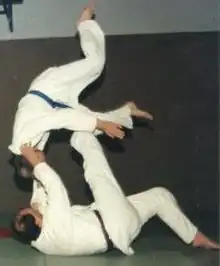Tomoe nage
Tomoe nage (巴投) is one of the traditional forty throws of jujutsu and Judo. It belongs to the third group (Sankyo) of the traditional throwing list, the traditional Gokyo (no waza),[1] and the current 67 Throws of Kodokan Judo.[2]
| Tomoe nage | |
|---|---|
 Tomoe nage throw | |
| Classification | Nage-waza |
| Sub classification | Sutemi-waza |
| Kodokan | Yes |
| Technique name | |
| Rōmaji | Tomoe-nage |
| Japanese | 巴投 |
| English | Circle throw |
| Korean | 배대 뒤치기 |
Tomoe nage is categorized as a front sacrifice technique or Mae-sutemi, because the technique is not a sweep or a trip and tori falls back in front of uke while throwing uke.[3] It is also one of Danzan Ryu's twenty throws in the Nagete list.
Technique
Tomoe nage is performed by the attacker (tori) gripping the opponent (uke) high and falling backward as in a backward roll. Once uke is off balance forward, tori plants a foot low on uke at waist level and applies strong pressure, rolling onto his own back with uke above him. This causes uke to flip over tori and land on his back. The final position is both practitioners are on their backs, head to head. Variations that maintain the high grip and complete the backward roll allow tori to mount uke at the completion of the throw. Counters to tomoe nage include crouching or evading the rising foot of the attacker.
Similar techniques, variants, and aliases
Similar techniques:
Aliases:
- Stomach throw
- Circular throw
- Monkey flip
Variants:
- Yoko tomoe nage (横巴投): Side circle throw
Further reading
- Kashiwazaki, Katsuhiko (1992), "Tomoe-nage", Judo Masterclass Techniques (second ed.), Ippon Books, ISBN 0-9518455-7-8
References
- Ohlenkamp, Neil (April 19, 2008). "The Traditional Gokyo of Kodokan Judo". JudoInfo.com. Retrieved 6 March 2013.
- Ohlenkamp, Neil (August 17, 2007). "The 67 Throws of Kodokan Judo". JudoInfo.com. Retrieved 6 March 2013.
- Ohlenkamp, Neil (March 6, 2005). "Classification of Techniques in Kodokan Judo". JudoInfo.com. Retrieved 6 March 2013.